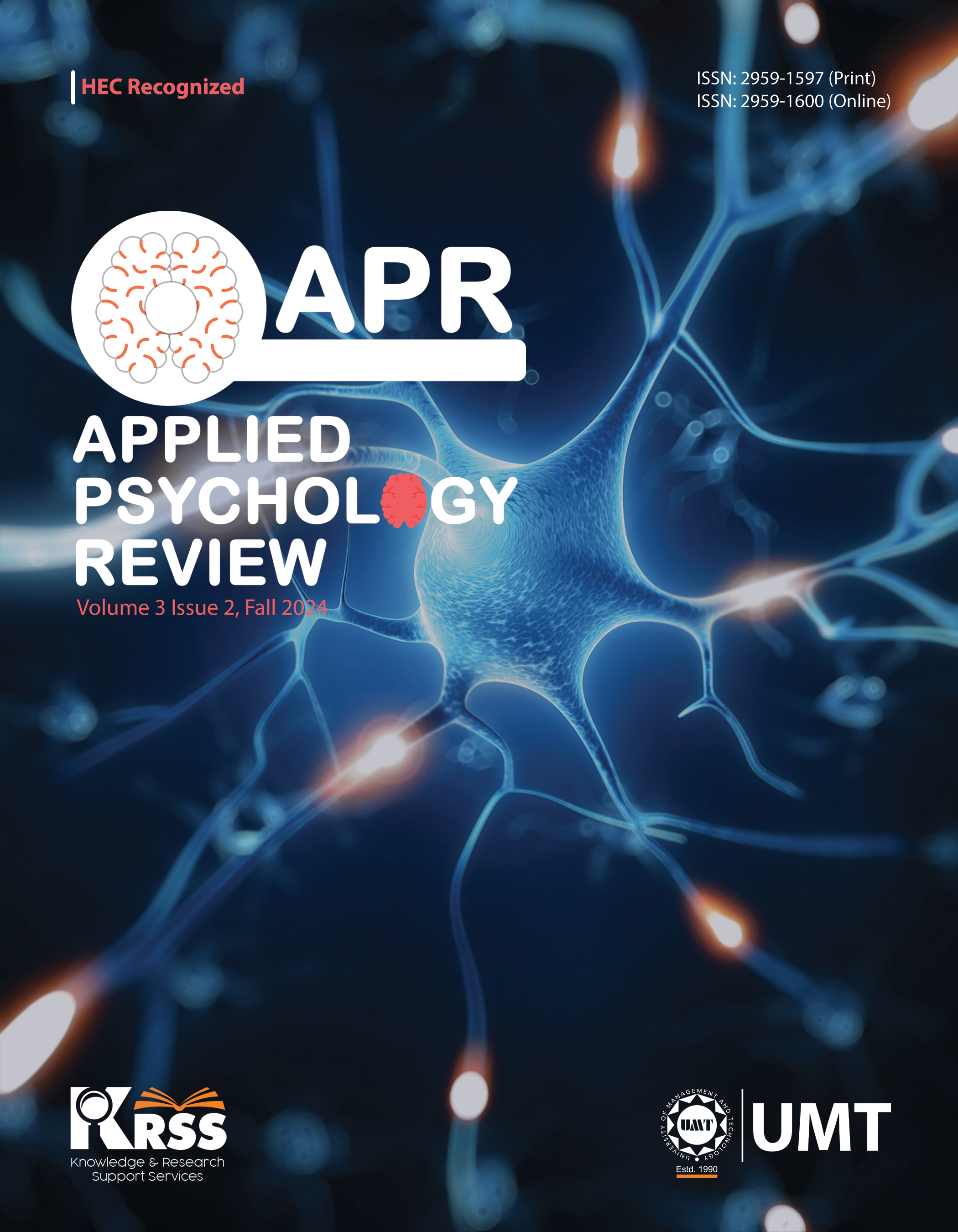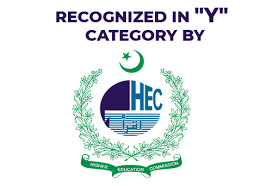Anger in Different Roles according to Islamic Perspective: A Qualitative Inquiry
Abstract
 Abstract Views: 0
Abstract Views: 0
Anger has an existential, as well as destructive value. The personal and social role in which one manifests anger is subject to exploration. Therefore, a qualitative research was conducted to understand anger in different roles according to Islamic guidelines (teachings of Quran and Hadith). For data collection, constructivism research paradigm and criterion sampling were used. A sample of 16 Muslim Scholars who have specialization in Quran and Hadith and adequate work experience of at least 5 years was selected. An interview guide was specifically formulated that majorly questioned the ways in which Islam has reflected on anger. Muslim Scholars have explained questions regarding the guidelines of anger in different predominant personal and social capacities as highlighted in Islam. They have given answers in light of Quranic references, sharing incidents of Prophet (PBUH) and his companions, as well as their experiences in dealing with people having anger issues. Quran and Hadith references were confirmed from original sources to ensure validity and authenticity of the data. Afterwards, thematic analysis was carried out. Results showed that the theme anger in different roles had 3 sub-themes, namely anger in authority, anger in parents’ role and anger in spousal role. The findings concluded that Islam doesn’t prohibit anger but guides that in every role, one needs to keep Allah’s pleasure and His guidelines in mind. The study has important implications in field of Islamic psychology as it would guide people about the appropriate anger in different roles.
Downloads
References
Ahmad, M., Begum, U., Qasim, M., & Hasnain, M. (2022). Rights of women in Islam and West: A comparative analysis. International Research Journal of Management and Social Sciences, 3(2), 135–152. https://doi.org/10.5281/zenodo.10258998
Al-Ghazali, A. H. (2015). Ihya’’ulum al-din: The revival of the religious sciences. Islamic Book Trust.
Ali, K. (2004). A beautiful example: The Prophet Muḥammad as a model for muslim husbands. Islamic Studies, 43(2), 273–291.
Ali, K. (2012, August 21). Muslim masculinities: Men have gender too. Feminism and Religion. https://feminismandreligion.com/2012/08/21/muslim-masculinities-men-have-gender-too-by-kecia-ali/
Ali, M. M. (2016). The empowerment of women: Islamic and western perspectives. International Journal of Islamic Thoughts, 5(1), 33–48.
Altalib, H. (2001). Training guide for Islamic workers . International Institute of Islamic Thought.
Averill, J. R. (1997). The emotions: An integrative approach. In R. Hogan, J. Johnson, & S. Briggs (Eds.), Handbook of personality psychology (pp. 513–541). Academic Press.
Beck, A. T. (1976). Cognitive therapy and the emotional disorders. International Universities Press
Benson, P. L., Scales, P. C., & Syvertsen, A. K. (2011). The contribution of the developmental assets framework to positive youth development theory and practice. Advances in Child Development and Behavior, 41, 197–230. https://doi.org/10.1016/B978-0-12-386492-5.00008-7
Braun, V., & Clarke, V. (2006). Using thematic analysis in psychology. Qualitative Research in Psychology, 3(2), 77–101. https://doi.org/10.1191/1478088706qp063oa
Chopra, D. (2009). The seven spiritual laws of success: A practical guide to the fulfillment of your dreams. ReadHowYouWant.
Crane, B. (2002). Full catastrophe living; using the wisdom of your body and mind to face stress, pain and illness: Jon Kabat-Zinn, 1996 Publisher: Piatkus, London ISBN: 0-749-915-854. Delta. Spirituality and Health International, 3(2), 52–52. https://doi.org/10.1002/shi.88
Creswell, J. W. (2007). Qualitative inquiry and research design: Choosing among five approaches (2nd ed.). Sage Publications.
Creswell, J. W. (2013). Qualitative inquiry & research design: Choosing among five approaches (3rd ed.). Sage Publications.
Crouch, M., & McKenzie, H. (2006). The logic of small samples in interview-based qualitative research. Social Science Information, 45(4), 483–499. https://doi.org/10.1177/0539018406069584
DiGiuseppe, R., & Tafrate, R. C. (2007). Understanding anger disorders. Oxford University Press.
Dix, T., Gershoff, E. T., Meunier, L. N., & Miller, P. C. (2004). The affective structure of supportive parenting: Depressive symptoms, immediate emotions, and child-oriented motivation. Developmental Psychology, 40(6), 1212–1227. https://doi.org/10.1037/0012-1649.40.6.1212
Eisenberg, N., Hofer, C., Spinrad, T. L., Gershoff, E. T., Valiente, C., Losoya, S. H., Zhou, Q., Cumberland, A., Liew, J., Reiser, M., & Maxon, E. (2008). Understanding mother-adolescent conflict discussions: concurrent and across-time prediction from youths' dispositions and parenting. Monographs of the Society for Research in Child Development, 73(2), vii–160. https://doi.org/10.1111/j.1540-5834.2008.00470.x
Fetsch, R. J., Yang, R. K., & Pettit, M. J. (2008). The RETHINK Parenting and Anger Management Program: a follow‐up validation study. Family Relations, 57(5), 543–552. https://doi.org/10.1111/j.1741-3729.2008.00521.x
Fitness, J. (2000). Anger in the workplace: An emotion script approach to anger episodes between workers and their superiors, co-workers, and subordinates. Journal of Organizational Behavior, 21(2), 147–162. https://doi.org/10.1002/(SICI)1099-1379(200003)21
Glasberg, A. L., Eriksson, S., & Norberg, A. (2007). Burnout and 'stress of conscience' among healthcare personnel. Journal of Advanced Nursing, 57(4), 392–403. https://doi.org/10.1111/j.1365-2648
Gottman, J. M., & Levenson, R. W. (2000). The timing of divorce: Predicting when a couple will divorce over a 14‐year period. Journal of Marriage and Family, 62(3), 737–745. https://doi.org/10.1111/j.1741-3737.2000.00737.x
Guba, E. G., & Lincoln, Y. S. (1994). Competing paradigms in qualitative research. In N. K. Denzin & Y. S. Lincoln (Eds.), Handbook of qualitative research (pp. 105–117). Sage Publications.
Hardy, D. S. (2023). Toward a Christian spirituality of anger. Spiritus: A Journal of Christian Spirituality, 23(1), 9–35. https://doi.org/10.1353/scs.2023.a899752
Hargreaves, A. (2000). Mixed emotions: Teachers' perceptions of their interactions with students. Teaching and Teacher Education, 16(8), 811–826. https://doi.org/10.1016/S0742-051X(00)00028-7
Harmon‐Jones, E. (2004). On the relationship of frontal brain activity and anger: Examining the role of attitude toward anger. Cognition and Emotion, 18(3), 337–361. https://doi.org/10.1080/02699930341000059
Hays, P., & Iwamasa, G. Y. (Eds.). (2006). Culturally responsive cognitive-behavioral therapy: Assessment, practice, and supervision. American Psychological Association.
Holmes, V. (2012). Helping couples deal with anger and conflict. In A. Vernon (Ed.), Cognitive and rational-emotive behavior therapy with couples: Theory and practice (pp. 65–80). Springer.
Holmes, M. (2004). Introduction: The importance of being angry: Anger in political life. European Journal of Social Theory, 7(2), 123–132. https://doi.org/10.1177/1368431004041747
Hosokawa, R., & Katsura, T. (2018). Role of parenting style in children’s behavioral problems through the transition from preschool to elementary school according to gender in Japan. International Journal of Environmental Research and Public Health, 16(1), Article e21. https://doi.org/10.3390/ijerph16010021
Kabir, K. S. (2007). Towards an Islamic framework of women empowerment. Tafhim: Ikim Journal of Islam and the Contemporary World, 2(2), 113–139. https://doi.org/10.56389/tafhim.vol2no2.5
Kristeller, J. L. (2015). Mindfulness, eating disorders, and food in take regulation. In B. D. Ostafin, M. D. Robinson, & B. P. Meier (Eds.), Handbook of mindfulness and self-regulation (pp. 199–215). Springer.
Lings, M. (1984). Muhammad: His life based on the earliest sources. Religious Studies, 20(3), 504–505.
Liu, B., Yang, Y., Geng, J., Cai, T., Zhu, M., Chen, T., & Xiang, J. (2022). Harsh parenting and children's aggressive behavior: A moderated mediation model. International Journal of Environmental Research And Public Health, 19(4), Article e2403. https://doi.org/10.3390/ijerph19042403
Lloyd, V. (2021). Anger: A secularized theological concept. In U. Schmiedel & J. Ralston (Eds.), The spirit of populism (pp. 25–39). Brill. https://doi.org/10.1163/9789004498327_003
Lockwood, N. R. (2003). Work/life balance. Challenges and solutions. Benefits Quarterly, 19(4), Article e94.
Lutfi, M. M., & Haris, A. (2021). How to deal with anger: A psychology and Islamic perspective. AMCA Journal of Community Development, 1(1), 13–16. https://doi.org/10.51773/ajcd.v1i1.23
Lyman, P. (2004). The domestication of anger: The use and abuse of anger in politics. European Journal of Social Theory, 7(2), 133–147. https://doi.org/10.1177/1368431004041748
Merriam, S. B. (2002). Basic interpretive qualitative research. In S. B. Merriam (Ed.), Qualitative research in practice (pp. 37–39). Jossey-Bass.
Miller, L. (2018). Anger between children and parents: how can we help? In E. Bradley & L. Emanuel (Ed.), What can the matter be? Therapeutic interventions with parents, infants and young children (pp. 121–135). Routledge.
Naz, S. (2015). A clinical study on the effectiveness of ingenuously adopted novaco's model of anger management for individuals having psychiatric problems in Pakistan [Doctoral dissertation, International Islamic University]. Pakistan Research Repository. https://prr.hec.gov.pk/jspui/handle/123456789//6782
Norona, A. N., & Baker, B. L. (2016). The effects of early positive parenting and developmental delay status on child emotion dysregulation. Journal of Intellectual Disability Research, 61(2), 130–143. https://doi.org/10.111/jir.12287
Parasuraman, S., & Greenhaus, J. H. (2002). Toward reducing some critical gaps in work-family research. Human Resource Management Review, 12(3), 299–312. https://doi.org/10.1016/S1053-4822(02)00062-1
Pekrun, R., Goetz, T., Titz, W., & Perry, R. P. (2002). Academic emotions in students' self-regulated learning and achievement: A program of qualitative and quantitative research. Educational Psychologist, 37(2), 91–105. https://doi.org/10.1207/S15326985EP3702_4
Peters, M. A. (2012). Anger and political culture: A time for outrage! Policy Futures in Education, 10(5), 563–568. https://doi.org/10.2304/pfie.2012.10.5.563
Porat, R., & Paluck, E. L. (2024). Anger at work. Frontiers in Social Psychology, 2, Article e1337715. https://doi.org/10.3389/frsps.2024.1337715
Potegal, M., & Novaco, R. W. (2009). A brief history of anger. In M. Potegal, G. Stemmler, & C. Spielberger (Eds.), International handbook of anger: Constituent and concomitant biological, psychological, and social processes (pp. 9–24). Springer.
Rodda, S. N., Bijker, R., Merkouris, S. S., Landon, J., Hawker, C. O., & Dowling, N. A. (2024). How to peer review quantitative studies, qualitative studies, and literature reviews: considerations from the ‘other’side. Current Addiction Reports, 11, 771–782. https://doi.org/10.1007/s40429-024-00594-8
Shapiro, S. L., Jazaieri, H., & de Sousa, S. (2016). Meditation and positive psychology. In S. J. Lopez & C. R. Snyder (Eds.), The Oxford handbook of positive psychology (3rd ed.). Oxford University Press.
Šimić, G., Tkalčić, M., Vukić, V., Mulc, D., Španić, E., Šagud, M., Olucha-Bordonau, F. E., Vukšić, M., & Hof, P. R. (2021). Understanding emotions: Origins and roles of the amygdala. Biomolecules, 11(6), Article e823. https://doi.org/10.3390/biom11060823
Spector, P. E., & Fox, S. (2002). An emotion-centered model of voluntary work behavior: Some parallels between counterproductive work behavior and organizational citizenship behavior. Human Resource Management Review, 12(2), 269–292. https://doi.org/10.1016/S1053-4822(02)00049-9
Sukhodolsky, D. G., Smith, S. D., McCauley, S. A., Ibrahim, K., & Piasecka, J. B. (2016). Behavioral interventions for anger, irritability, and aggression in children and adolescents. Journal of Child and Adolescent Psychopharmacology, 26(1), 58–64. https://doi.org/10.1089/cap.2015.0120
Thich, N. H. (2002). Anger: Wisdom for cooling the flames. River Head Books.
Toch, H. (2002). Occupational stress. In H. Toch (Ed.), Stress in policing (pp. 73–90). American Psychological Association. https://doi.org/10.1037/10417-003
Walitzer, K. S., Deffenbacher, J. L., & Shyhalla, K. (2015). Alcohol-Adapted anger management treatment: A randomized controlled trial of an innovative therapy for alcohol dependence. Journal of substance abuse treatment, 59, 83–93. https://doi.org/10.1016/j.jsat.2015.08.003
Williams, R. (2017). Anger as a basic emotion and its role in personality building and pathological growth: The neuroscientific, developmental and clinical perspectives. Frontiers in Psychology, 8, Article e1950. https://doi.org/10.3389/fpsyg.2017.01950
Copyright (c) 2024 Rakia Ashraf, Aisha Sitwat

This work is licensed under a Creative Commons Attribution 4.0 International License.




